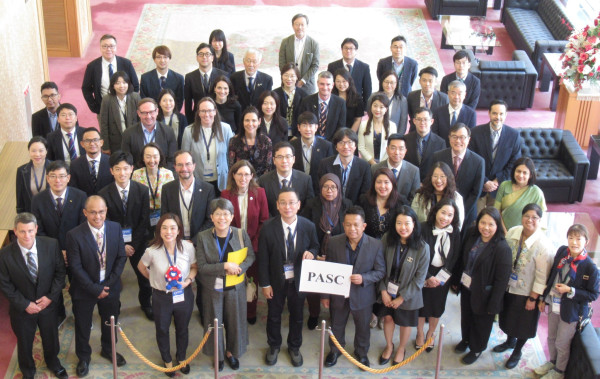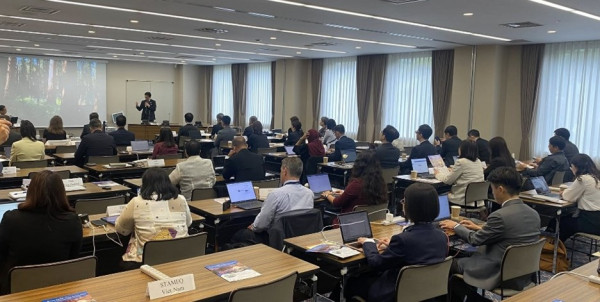PASC AGM 2025: strengthening international rules-based systems
The 47th Pacific Area Standards Congress (PASC) Annual General Meeting was held in May in Tokyo, Japan. This brought together key players in international standardisation from the Asia Pacific, Pacific Rim and Indo Pacific regions.

Delegates at the PASC 47th AGM in Tokyo
PASC – connecting the Pacific Asia region
PASC is an independent and voluntary organisation of 28 Pacific Rim & Indo Pacific national standards bodies and associated Government organisations responsible for standardisation, established in 1972. It supports engagement in the international standardisation system for the advancement of economic, societal, and environmental well-being.
The Asia-Pacific and Indo Pacific region accounts for over 60% of the world’s population and has the highest levels of growth in the world. International standards are essential for this region, to facilitate trade, to spread knowledge, disseminate innovative advances in technology and improve market access for goods and services.
Governance and shared experiences
Presentations and workshops included a refresh of PASC’s strategy and priorities. From PASC’s annual general meeting key governance updates included:
- Standards Australia appointed to the PASC Secretariat (2026–2028)
- Singapore confirmed as host for PASC 2026, with China hosting in 2027
- Standardization Administration of China (SAC) continues as PASC Chair.
The rest of the event focused on digital transformation, business models, strategic planning, the opportunity and challenges AI presents to standards development and access, and improving access to standards. These are all critical themes for industry stakeholders navigating a rapidly evolving global landscape and where standards can provide some much-needed consistencies, guidance and assurances.
Updates sharing common ground and new initiatives came from the world’s three leading international standards bodies – ISO (International Organisation for Standardisation), IEC (International Electrotechnical Commission) and ITU (International Telecommunication Union).

Digital transformation in standards
The joint workshop on digital transformation highlighted how standards bodies are adapting to technological change. Presentations came from the international standards bodies and national members who showcased projects: Australia’s digital standards roadmap; New Zealand’s access sponsorship by government regulators model, and multimedia outreach to small businesses and regulators; and China’s young professionals’ program to build future leadership for younger digital native users of standards.
These initiatives reflect a broader shift toward digitally accessible, user-friendly standards that support innovation, increased utility and easier compliance across sectors.
Enhancing access and implementation
A central theme was reducing barriers to standards adoption, especially for small-to-medium enterprises. It was widely recognised that cost, format and time to market are universal challenges for standards bodies and implementing standards both globally and domestically. There was general agreement that the value proposition of standards was not always widely understood.
A range of approaches designed to increase uptake and reduce costs were discussed including freemium (a pricing strategy where a basic product or service is offered for free, while additional features, services, or virtual/physical goods are offered for a premium price) and government-subsidised access models (like sponsored access done in New Zealand), mobile-first platforms and curated content, and localised translations and integration into education and regulation.
Representatives from host nation Japan helped member nations to understand how national industry representation can be eased into participation through ‘observer’ status on international committees first, to understand the role of standards development and mirror committees before getting involved.
Strategic planning: 2026–2030
Breakout sessions helped shape the next PASC Strategic Plan, aiming to enhance PASC’s global influence and ensure standards remain relevant and responsive to industry needs. There was a focus on stakeholder engagement, particularly identifying and aligning with key industry players, plus innovation and anticipating future trends and emerging needs and finally action planning so members are clear on responsibilities, timelines, and evaluation metrics for future PASC meetings.
The Pacific Islands Standards Committee (PISC) also gave an update on its activities in the Pacific islands over the last year, with initiatives including Standards New Zealand-hosted Pacific Islands Standards Week in August 2024 and their involvement in the Pacific Quality Policy work happening concurrently with PASC.
Emerging standards and global trends
Standards can reflect growing industry demand and lead the way for upscaling of new technologies and systems. International forums are an invaluable way of gaining exposure to advances happening across the globe and develop standards that support sustainability, AI governance, and infrastructure resilience. They are also an opportunity to reinforce and strengthen existing international rules-based systems and institutions that have served the global economy well for many years.
Several new standardisation initiatives were profiled from countries including Japan and Singapore, including ISO’s Digital Carbon Data Model, ISO/IEC proposals for generative AI testing, Standards for non-destructive testing in civil engineering, perovskite photovoltaic (PV) devices, Quantum Computing and Simulation, Robot Application Infrastructure (RAI), tyre abrasion rates and a product certification system related to regenerative medicine.
As the Asia-Pacific continues to lead in innovation and collaboration, businesses and regulators alike are encouraged to use and adopt international standards to stay efficient, competitive, interoperable and compliant.
Learn more about PASC and the group’s work:
